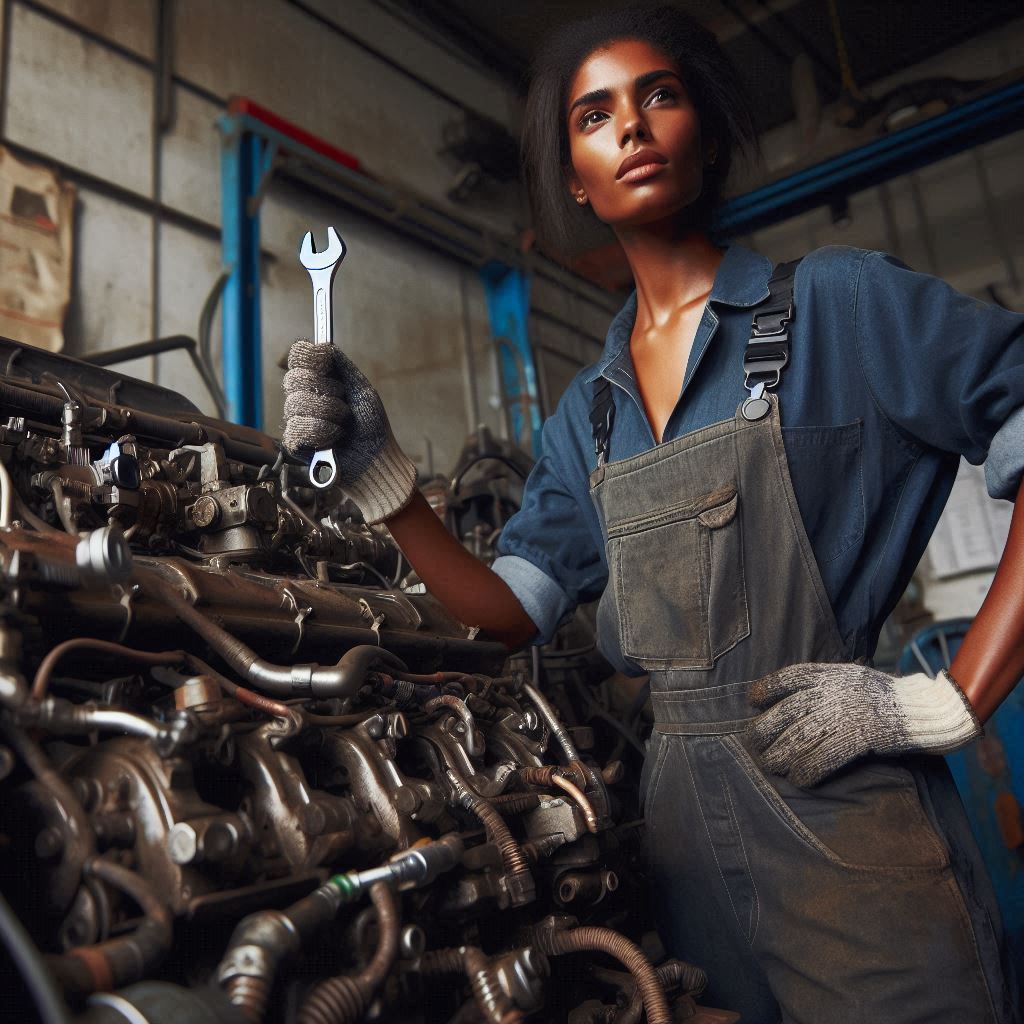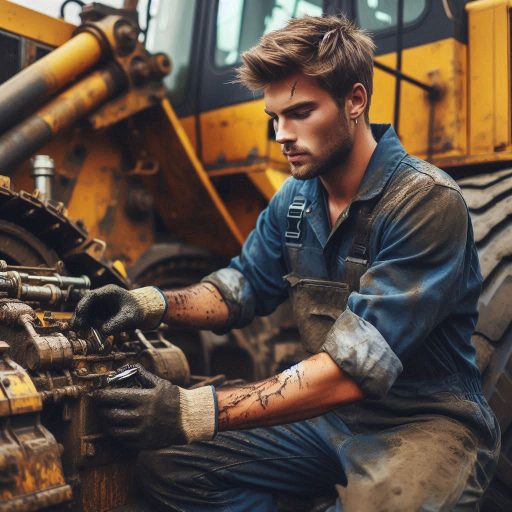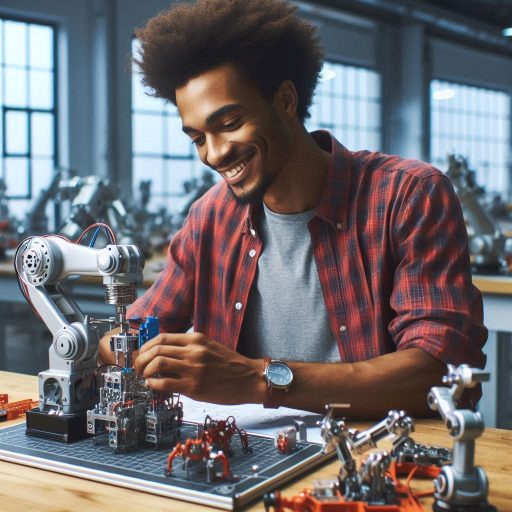Introduction
Explanation of What an Industrial Machinery Mechanic Does
An Industrial Machinery Mechanic specializes in the installation, maintenance, and repair of machinery used in industrial settings.
They work on complex systems, including conveyor belts, pumps, and compressors.
Their tasks involve diagnosing mechanical problems, performing routine maintenance, and making repairs to ensure machines run smoothly.
Mechanics use various tools and techniques to troubleshoot issues and restore equipment to optimal performance.
Their role is crucial in keeping industrial operations efficient and minimizing downtime.
Importance of Industrial Machinery Mechanics in Various Industries
Industrial Machinery Mechanics are vital across many sectors, including manufacturing, energy, and production.
Their expertise ensures that machinery operates reliably and efficiently, which is essential for maintaining productivity.
By preventing equipment failures and reducing downtime, they help businesses avoid costly disruptions and delays.
Their work supports high-quality production standards and contributes to the overall success of industrial operations.
In essence, Industrial Machinery Mechanics play a key role in the smooth functioning of industries that depend on advanced machinery and technology.
Education and Training Requirements
High school diploma or equivalent is usually required
To embark on a career as an industrial machinery mechanic, a high school diploma or equivalent is typically required.
This credential lays the groundwork in fundamental subjects such as math, science, and technical skills.
These basics are essential for understanding more complex machinery and systems later on.
This educational requirement ensures that candidates possess the foundational knowledge needed for further training and practical application in the field.
Some employers prefer candidates with post-secondary education in industrial maintenance or a related field
While a high school diploma meets the basic requirement, many employers prefer candidates who have pursued post-secondary education in industrial maintenance or a related field.
Technical programs and community colleges offer specialized courses that provide an in-depth understanding of machinery and maintenance practices.
These programs often include hands-on training, which helps students gain practical experience and apply theoretical knowledge in real-world scenarios.
Post-secondary education can enhance a candidate’s qualifications and make them more competitive in the job market.
On-the-job training is common
On-the-job training is a prevalent method for gaining the specific skills needed to excel as an industrial machinery mechanic.
This training allows new hires to learn directly from experienced professionals within the workplace.
It covers the operation, maintenance, and repair of specific machinery used by the company.
On-the-job training is invaluable for adapting to various types of industrial equipment and understanding company-specific protocols.
Many mechanics build their expertise through this practical experience, which complements their formal education and helps them become proficient in their roles.
Basically, while a high school diploma is the basic entry requirement, additional qualifications and training can significantly enhance a candidate’s prospects.
Post-secondary education and on-the-job training both play crucial roles in preparing individuals for a successful career as an industrial machinery mechanic.
Read: CAD Technician vs. Draftsman: Key Differences
Technical Skills
Proficiency in reading and interpreting blueprints and technical manuals
A crucial technical skill for industrial machinery mechanics is proficiency in reading and interpreting blueprints and technical manuals.
Blueprints provide detailed diagrams of machinery, including its components and how they fit together.
Understanding these diagrams is essential for accurate assembly, maintenance, and repair.
Technical manuals offer specific instructions and troubleshooting tips for various equipment.
Mechanics must be able to interpret these documents to diagnose issues, perform repairs, and ensure machinery operates efficiently.
Knowledge of mechanical, electrical, and hydraulic systems
Industrial machinery mechanics must possess a solid knowledge of mechanical, electrical, and hydraulic systems.
Mechanical knowledge involves understanding how different parts of a machine interact and operate.
This includes gears, bearings, and motors.
Electrical knowledge is crucial for working with wiring, circuits, and control systems.
Mechanics need to troubleshoot electrical problems and ensure safe electrical connections.
Hydraulic systems involve fluid-powered machinery and require knowledge of pumps, valves, and hydraulic circuits.
Proficiency in these areas ensures mechanics can handle a wide range of equipment and systems.
Ability to use a variety of tools and equipment
The ability to use a variety of tools and equipment is another essential technical skill.
Industrial machinery mechanics work with hand tools such as wrenches, screwdrivers, and pliers, as well as power tools like drills and grinders.
They also use specialized equipment such as multimeters, alignment tools, and hydraulic jacks.
Each tool serves a specific purpose, from performing routine maintenance to complex repairs.
Mechanics must know how to select and use the right tool for each task, ensuring accuracy and efficiency in their work.
Generally, technical skills are foundational to the role of an industrial machinery mechanic.
Proficiency in reading blueprints, knowledge of various systems, and the ability to use diverse tools and equipment are crucial for success.
These skills enable mechanics to effectively maintain, repair, and troubleshoot complex machinery, ensuring smooth and efficient operation in industrial settings.
Read: CAD Technician Certification: What You Need to Know
Experience
Entry-level positions may require minimal experience, while more advanced roles may need several years of experience
In the field of industrial machinery mechanics, entry-level positions often require minimal experience.
These roles are designed for individuals who are just starting their careers and may have limited hands-on experience.
Typically, new hires in these positions receive on-the-job training to build their skills and knowledge.
However, as mechanics advance to more senior roles, several years of experience become essential.
Advanced positions require a deep understanding of complex machinery, systems, and troubleshooting techniques.
This experience ensures that mechanics can handle intricate repairs and oversee the maintenance of specialized equipment.
Experience with specific types of industrial machinery may be preferred by some employers
Employers often have specific preferences when it comes to the experience of industrial machinery mechanics.
While general mechanical skills are crucial, experience with particular types of industrial machinery can be highly valued.
For instance, a company specializing in heavy manufacturing equipment may prefer candidates with prior experience in handling similar machinery.
This specific experience means the mechanic is already familiar with the unique challenges and maintenance needs of that equipment.
As a result, such candidates can often adapt more quickly and contribute more effectively from the start.
All in all, the level of experience required for industrial machinery mechanics varies by job role.
Entry-level positions typically need minimal experience, focusing on on-the-job training to develop skills.
More advanced roles demand several years of experience to ensure proficiency in handling complex machinery and systems.
Additionally, experience with specific types of equipment can be a significant advantage for candidates, aligning with employer preferences and enhancing job prospects.
Read: Essential Skills for CAD Technicians

Certifications and Licenses
Some employers may require Industrial Machinery Mechanics to hold certifications in specific areas, such as welding or electrical systems
Certifications can be a significant factor in the hiring process for industrial machinery mechanics.
Some employers require candidates to hold certifications in specific areas relevant to their operations.
For instance, certifications in welding are often necessary for mechanics who will be involved in repairing or fabricating metal components.
Similarly, certifications in electrical systems are essential for those working with electrical machinery or troubleshooting electrical issues.
These certifications demonstrate a mechanic‘s specialized skills and knowledge, which can enhance their qualifications and make them more competitive in the job market.
Possessing a valid driver’s license may also be necessary for some positions
In addition to technical certifications, a valid driver‘s license may be necessary for certain positions.
Mechanics who are required to travel between different job sites or service locations need a driver‘s license to operate a company vehicle.
This requirement is especially common in roles that involve fieldwork or on-site repairs.
Having a valid driver‘s license ensures that mechanics can fulfill their responsibilities efficiently and reach various locations as needed.
For employers, this requirement helps ensure that their staff can provide timely and reliable service across different sites.
In short, while specific certifications and licenses can vary depending on the employer and job requirements, they play a crucial role in the role of an industrial machinery mechanic.
Certifications in areas like welding or electrical systems can be essential for specialized tasks, while a valid driver‘s license may be necessary for positions involving travel.
These qualifications help mechanics meet industry standards and perform their duties effectively.
Read: Day in the Life of a CAD Technician
Physical Requirements
Industrial Machinery Mechanics often work in environments that may be noisy, dirty, or cramped
Industrial machinery mechanics frequently operate in environments that can be noisy, dirty, or cramped.
Machinery operations often generate significant noise, which can impact hearing and concentration.
Mechanics must wear appropriate hearing protection to safeguard their auditory health.
Work areas can also be dirty, with dust, grease, and debris common in industrial settings.
This requires mechanics to wear protective gear and adhere to safety protocols to minimize exposure to harmful substances.
Additionally, the workspace may be cramped, requiring mechanics to maneuver in tight spaces while performing repairs or maintenance tasks.
Adapting to these challenging conditions is an essential aspect of the job.
Physical stamina and strength are important for lifting heavy equipment and standing for long periods
Physical stamina and strength are crucial for industrial machinery mechanics.
The job often involves lifting and maneuvering heavy equipment, such as motors, pumps, and large machine parts.
Mechanics need to possess the physical strength to handle these tasks safely and efficiently.
Long periods of standing or kneeling are also common, requiring endurance and resilience.
Mechanics may spend extended hours on their feet while performing intricate repairs or conducting maintenance checks.
The ability to maintain physical endurance and strength helps ensure that mechanics can perform their duties effectively and minimize fatigue-related errors.
In essence, industrial machinery mechanics face demanding physical conditions in their work environments.
They must be prepared to work in noisy, dirty, and cramped spaces while maintaining physical stamina and strength.
These physical requirements are integral to performing the job effectively and ensuring safe, efficient operation and maintenance of industrial machinery.
Discover More: Specializations in Laboratory Technician Roles
Discover More: Women in Nuclear Engineering: Breaking Barriers
Transform Your Career Today
Unlock a personalized career strategy that drives real results. Get tailored advice and a roadmap designed just for you.
Start NowSafety and Compliance
Understanding and following safety guidelines and regulations is crucial to prevent accidents and injuries
For industrial machinery mechanics, understanding and adhering to safety guidelines and regulations is vital.
Working with heavy machinery and complex systems presents numerous hazards, including moving parts, high temperatures, and electrical components.
Mechanics must follow established safety protocols to prevent accidents and injuries.
This includes wearing appropriate personal protective equipment (PPE), such as gloves, goggles, and ear protection.
Proper training in safety procedures helps mechanics identify potential risks and implement measures to mitigate them.
Adherence to safety regulations not only protects the mechanic but also ensures a safer work environment for everyone.
Keeping up-to-date with industry standards and regulations is essential for maintaining compliance
Staying current with industry standards and regulations is essential for maintaining compliance in the field of industrial machinery maintenance.
Regulations and standards frequently evolve to address new safety concerns and technological advancements.
Mechanics must keep abreast of these changes to ensure that their practices remain compliant with the latest requirements.
This includes participating in ongoing training, attending industry workshops, and reviewing updated safety manuals.
By staying informed, mechanics can adapt to new standards and continue to operate within legal and safety guidelines, thereby avoiding potential penalties and ensuring the safety of their workplace.
All in all, safety and compliance are fundamental aspects of the role of an industrial machinery mechanic.
Understanding and following safety guidelines is crucial for preventing accidents and injuries, while keeping up-to-date with industry standards ensures ongoing compliance.
Both aspects are integral to maintaining a safe and effective work environment.
See Related Content: Pros and Cons of Being a Telecommunications Technician
Problem-Solving Skills
Industrial Machinery Mechanics must be able to diagnose and troubleshoot issues with machinery
A critical skill for industrial machinery mechanics is the ability to diagnose and troubleshoot issues with machinery.
When equipment malfunctions or fails, mechanics must quickly identify the root cause of the problem.
This involves using diagnostic tools, interpreting error codes, and examining mechanical, electrical, or hydraulic systems.
Effective troubleshooting requires a methodical approach to pinpoint the source of the issue, whether it‘s a worn-out part, electrical fault, or hydraulic leak.
The ability to diagnose problems accurately ensures that repairs are efficient and minimize downtime for the machinery.
Being able to analyze complex problems and develop effective solutions is a key aspect of the job
Analyzing complex problems and developing effective solutions is another essential aspect of the job.
Industrial machinery mechanics often encounter intricate issues that require a deep understanding of how different systems interact.
Mechanics must be able to break down complex problems into manageable parts and assess each component systematically.
This analysis helps in devising solutions that address the underlying issues rather than just treating the symptoms.
Creative problem-solving and critical thinking skills are crucial for finding innovative solutions and ensuring that machinery operates smoothly and efficiently.
In summary, problem-solving skills are fundamental for industrial machinery mechanics.
Diagnosing and troubleshooting machinery issues requires a thorough approach, while analyzing complex problems and crafting effective solutions is vital for maintaining operational efficiency.
These skills ensure that mechanics can address and resolve technical challenges effectively, contributing to the overall success of industrial operations.
Conclusion
The Key Requirements for Becoming an Industrial Machinery Mechanic
To become an Industrial Machinery Mechanic, a high school diploma or GED is essential.
Specialized training, such as technical courses or an apprenticeship, provides the necessary hands-on experience.
Mechanics must possess a strong understanding of mechanical systems and demonstrate excellent troubleshooting and repair skills.
Physical stamina is crucial, as the job often involves lifting heavy equipment and working in various conditions.
Problem-solving skills are vital for diagnosing and fixing complex machinery issues efficiently.
The Importance of Continuous Learning and Staying Current in the Field
In the field of industrial machinery, continuous learning is indispensable.
As technology advances rapidly, mechanics must stay up-to-date with the latest tools and techniques.
Ongoing education and certification help professionals maintain their expertise and adapt to new developments.
Engaging in workshops, training programs, and industry seminars is crucial for keeping skills relevant.
Embracing new technologies and methodologies ensures that mechanics remain efficient and competitive.
By prioritizing lifelong learning, Industrial Machinery Mechanics can successfully navigate the evolving landscape of their profession.
[E-Books for Sale]
The Big Book of 500 High-Paying Jobs in America: Unlock Your Earning Potential
$19.99 • 500 High-Paying Jobs • 330 pages
Explore 500 high-paying jobs in America and learn how to boost your career, earn more, and achieve success!
See All 500 High-Paying Jobs of this E-Book
1001 Professions Without a Degree: High-Paying American Jobs You Can Start Now
$19.99 • 1001 Professions Without a Degree • 174 pages
Discover 1001 high-paying jobs without a degree! Unlock career tips, skills, and success strategies for just $19.99!




